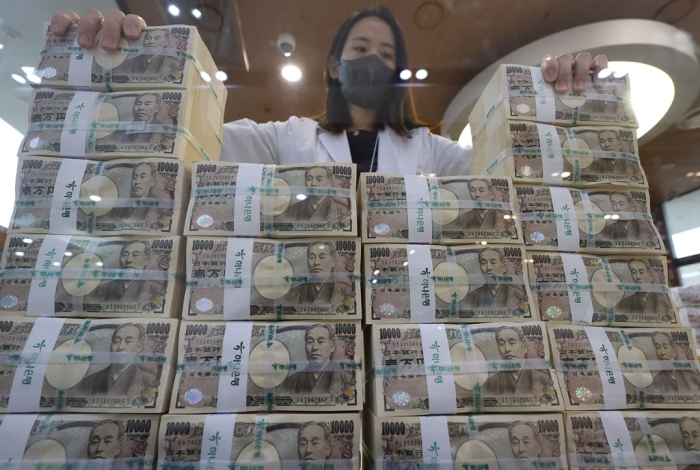Foreign exchange
Koreans’ yen savings snap growth streak despite BOJ exit talk
The BOJ is unlikely to raise interest rates this year despite its expected monetary policy shift, limiting the yen’s upside – analysts
By Jan 10, 2024 (Gmt+09:00)
2
Min read
Most Read
LG Chem to sell water filter business to Glenwood PE for $692 million


Kyobo Life poised to buy Japan’s SBI Group-owned savings bank


KT&G eyes overseas M&A after rejecting activist fund's offer


StockX in merger talks with Naver’s online reseller Kream


Mirae Asset to be named Korea Post’s core real estate fund operator



Yen-denominated deposits in South Korea slid for the first time in eight months as local investors took profits from the recent gains in the major currency despite expectations that the Bank of Japan may exit its ultra-loose monetary policy this year.
The balance of yen savings at five major South Korean lenders – KB Kookmin Bank, Shinhan Bank, Hana Bank, Woori Bank and NH Bank – totaled 1.1 trillion yen ($7.6 billion) as of the end of December 2023, down 5.3% from the previous month, according to domestic financial industry sources on Tuesday.
The retreat came as Japan’s central bank is unlikely to drastically shift monetary policy anytime soon, limiting the yen’s upside, even as last month the BOJ indicated an exit from its decade-long easing program, analysts in Seoul said.
The Japanese unit rose in December as the BOJ suggested it intends to end the ultra-loose policy once the authority sees sustained and stable 2% inflation powered by domestic demand and wage growth. The yen has risen as much as 8.8% to 9.2647 versus the South Korean won during the month from a 15-year low hit in November, according to Bloomberg data.
“The BOJ’s policy shift will be really slow,” said Baek Seok-hyun, an analyst at Shinhan Bank in Seoul. “It will be difficult to make satisfactory returns from investment in the yen at this point.”
DIFFICULT TO RAISE INTEREST RATES
Japanese currency deposits in South Korea have reported monthly gains on-month since April of last year as the increasing number of residents took advantage of the yen’s weakness to load up on the unit for investment and travel purposes. The savings at those five banks grew for a seventh straight months to more than double to 1.2 trillion yen in November 2023 from 597.9 billion yen in April of the same year.
The yen had depreciated to 8.5144 per the won in November, the lowest since 2008 when the world’s financial markets were in turmoil due to the global financial crisis, according to Bloomberg data. The weakness came as Japan’s central bank maintained its negative interest rate policy while its South Korean counterpart left the door open to raising its policy interest rate from the current 3.50%.
Analysts in Seoul doubted the yen’s further rebound versus the South Korean currency.
"The BOJ may shift its policy this year but it won’t be easy to raise interest rates," said Park Sang-hyun, an economist at HI Investment & Securities. "The yen is likely to trade at around 9.2 to the won on average this year."
Shinhan’s Baek forecasted the Japanese unit’s upside to be capped at 9.5.
On Wednesday morning, the yen eased 0.2% to 9.1077 against the won.
Write to Eui-Jin Jeong at justjin@hankyung.com
Jongwoo Cheon edited this article.
More to Read
-
 Foreign exchangeYen deposits at Korean banks surge to record $9.9 bn
Foreign exchangeYen deposits at Korean banks surge to record $9.9 bnDec 19, 2023 (Gmt+09:00)
2 Min read -
 Central bankBOK chief says rates need to stay high for over 6 months
Central bankBOK chief says rates need to stay high for over 6 monthsNov 30, 2023 (Gmt+09:00)
3 Min read -
 Foreign exchangeYen hits 15-year low vs Korean won on less hawkish BOJ
Foreign exchangeYen hits 15-year low vs Korean won on less hawkish BOJNov 03, 2023 (Gmt+09:00)
1 Min read -
 Foreign exchangeYen’s plunge spurs bargain-hunting in Korea; savings fastest in 6 years
Foreign exchangeYen’s plunge spurs bargain-hunting in Korea; savings fastest in 6 yearsJun 23, 2023 (Gmt+09:00)
2 Min read
Comment 0
LOG IN


